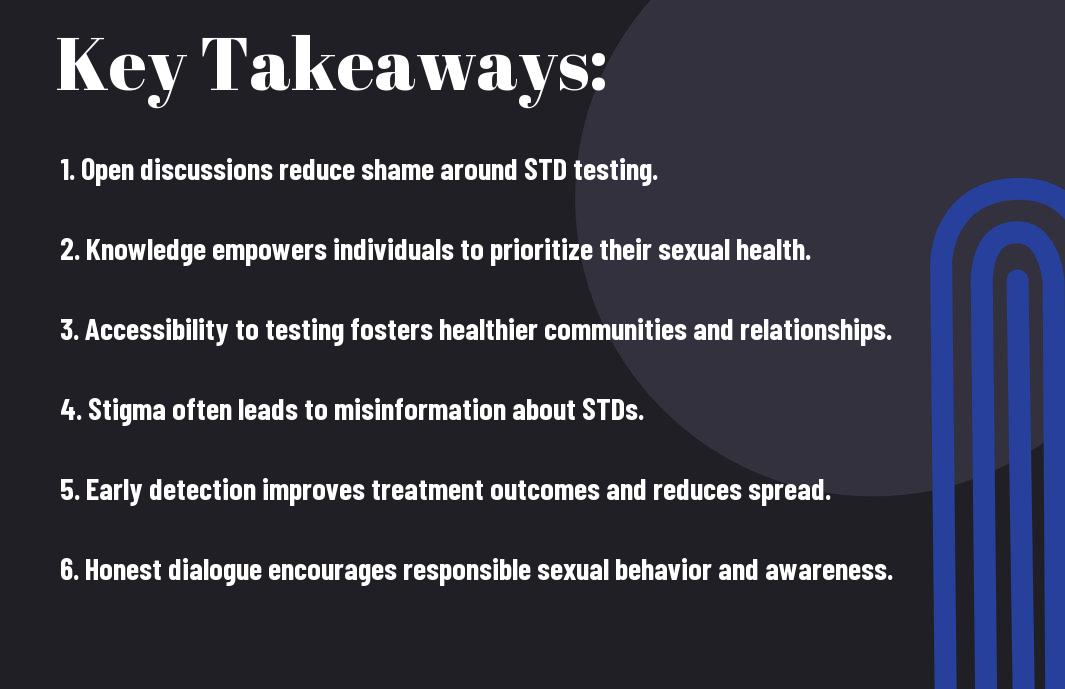Over the years, the conversation around STD testing has often been clouded by stigma and misunderstanding. It’s important for you to realize that engaging in open discussions about your sexual health not only benefits you but also contributes to a more informed community. By breaking the silence, you can help dispel myths and encourage normalization of regular testing, fostering a healthier approach to sexual wellness. Understanding the significance of testing empowers you to take control of your health and the health of those around you.
Key Takeaways:
- Open Dialogue: Initiating conversations about STD testing can help normalize the topic, making it easier for individuals to seek necessary care.
- Reducing Shame: Discussing STDs openly helps to minimize the stigma associated with them, fostering a more supportive community.
- Encouraging Testing: Transparent discussions can motivate more people to get tested, leading to earlier detection and treatment.
- Improving Education: Sharing information about STDs and testing options raises awareness and dispels myths, leading to informed choices.
- Community Support: Establishing a culture of openness around STD conversations strengthens community ties and encourages mutual support.

Understanding STDs
Your awareness of sexually transmitted diseases (STDs) is crucial for maintaining sexual health. STDs are infections transmitted through sexual contact, and they can affect anyone who is sexually active. By understanding what STDs are, you can make informed decisions about your sexual health and seek necessary testing and treatment.
Types of STDs
Your knowledge of the different types of STDs can help you recognize potential risks. Here are some common STDs:
- Chlamydia
- Gonorrhea
- Syphilis
- Human Immunodeficiency Virus (HIV)
- Herpes Simplex Virus (HSV)
Recognizing the different types of STDs will empower you to take proactive measures regarding testing and treatment.
| STD | Transmission Method |
|---|---|
| Chlamydia | Unprotected sex |
| Gonorrhea | Unprotected sex |
| Syphilis | Direct contact with sores |
| HIV | Unprotected sex, blood contact |
| HSV | Direct contact with infected skin |
Facts and Myths about STDs
About STDs, there are many misconceptions that can lead to stigma and misinformation. It’s important to differentiate between facts and myths to ensure that you are well-informed.
It is a common myth that only promiscuous individuals contract STDs; however, anyone who is sexually active can be at risk. Additionally, many STDs can be asymptomatic, meaning that you might not show signs even when infected. Early detection through regular testing is crucial, as untreated STDs can have serious health implications. Understanding STD transmission helps dispel myths, allowing for safer practices. Be proactive about your sexual health to reduce risks and facilitate open conversations surrounding STDs.
The Importance of STD Testing
Clearly, understanding the significance of STD testing is fundamental to your sexual health. Regular testing helps you stay informed about your health status and protects your partners as well. By engaging in open conversations about sexual health, you can help to promote a culture of support and understanding. For more insights, check out Taking the Stigma out of STIs.
Health Implications
Beside promoting safe sexual practices, STD testing plays a vital role in avoiding long-term health complications. Undiagnosed STDs can lead to serious issues such as infertility, chronic pain, or increased risk of HIV. By prioritizing regular testing, you are taking proactive steps toward safeguarding not only your health but that of your future partners as well.
Early Detection and Treatment
After getting tested, early detection of STDs is key in addressing any potential issues before they escalate. This can significantly improve your treatment outcomes and reduce the risk of transmitting STDs to others.
Even with many STDs being asymptomatic, early detection can prevent possible complications like infertility or chronic health conditions. Upon diagnosis, treatments are often available that can effectively manage or even cure certain STDs. By taking the initiative to get tested, you empower yourself to take charge of your health, ensuring a better quality of life and a safer environment for your relationships.
Barriers to Open Conversations
Unlike other health discussions, conversations about STD testing often face significant barriers. Many individuals feel uncomfortable initiating these conversations due to the fear of judgment or misunderstanding. This reluctance can contribute to an ongoing cycle of silence and misinformation, which ultimately affects both personal health and public awareness. Addressing these barriers is important for fostering a more informed and open dialogue around sexual health.
Social Stigma
Any discussion surrounding STDs can trigger feelings of shame or embarrassment due to pervasive social stigma. This stigma can prevent you from seeking necessary testing or sharing your health status with partners. The fear of being labeled or judged can hinder open communication, ultimately impacting your overall well-being.
Lack of Education
Lack of knowledge about STDs and the testing process can also create substantial barriers to open conversations. When you do not have accurate information, it can lead to misconceptions about risks and preventatives, hindering your ability to engage in healthy discussions.
To overcome this barrier, it’s important to seek out reliable resources and gain a solid understanding of STDs and testing. Many people are unaware that STDs can be asymptomatic, meaning you could be at risk without any symptoms. Educating yourself on prevention methods, testing frequency, and the potential consequences of untreated STDs can empower you to have informed discussions. Being well-informed will not only assist you in making sound health decisions but also encourage you to share knowledge with others, thereby breaking the cycle of stigma.
Promoting Open Dialogue
Now, fostering open dialogue around STD testing is necessary to dispelling misconceptions and reducing the stigma associated with sexual health. When you engage in conversations about testing, you contribute to a culture where individuals feel empowered to prioritize their health and wellbeing. Embracing transparency not only benefits you but also those around you, creating an informed community that values sexual health awareness.
Creating Safe Spaces
Against a backdrop of shame and fear, it’s important to create environments where individuals feel comfortable discussing sensitive topics related to STD testing. Establish safe spaces in your community, whether through support groups, workshops, or online forums, where individuals can express their concerns, ask questions, and share experiences without fear of judgment.
Encouraging Honest Communication
Beside creating safe spaces, you should encourage honest communication about STD testing among friends, partners, and healthcare providers. Open conversations promote understanding and help break the silence surrounding sexual health topics, allowing you to approach testing with confidence and clarity.
In addition, honest communication serves to strengthen relationships, both personal and professional. By openly discussing your experiences with STD testing, you not only reassure yourself but also inspire others to do the same. This creates a ripple effect, leading to greater awareness of the importance of regular testing and reinforcing the message that sexual health is a shared responsibility. Being forthright about STDs can help eliminate the fear that often accompanies these discussions, ultimately leading to healthier choices and safer practices.
Resources for STD Testing
Once again, having access to the right resources can empower you to take control of your sexual health. Numerous organizations and healthcare providers offer comprehensive STD testing services that are confidential and accessible. Whether you prefer visiting a clinic, utilizing at-home testing kits, or seeking information online, there are options available to suit your needs. Don’t hesitate to seek out these resources to help ensure your well-being.
Where to Get Tested
Against the backdrop of stigma and fear, there are various places you can go to get tested for STDs. Many community health centers, clinics, and hospitals offer testing services at low or no cost, ensuring that you can access safe and reliable testing without financial burden. Additionally, some pharmacies provide discreet testing options, allowing you to maintain your privacy while prioritizing your health.
Support Services Available
About the emotional and mental toll that an STD diagnosis can put you through, there are numerous support services ready to help you navigate this journey. Many organizations offer counseling, support groups, and hotlines to assist you in coping with your feelings and guide you toward the right treatment options.
Hence, accessing support services can provide you with vital emotional assistance as you navigate your sexual health. These resources can help you connect with trained professionals who understand your concerns and can offer personalized guidance. Additionally, support groups can foster a sense of community, allowing you to share your experiences while learning from others who have faced similar challenges. By reaching out, you can break free from isolation and empower yourself with knowledge and support.

The Role of Healthcare Providers
Not all healthcare providers approach the topic of STD testing with the sensitivity and openness required to foster constructive conversations. It is necessary for you to seek out providers who actively promote discussions around sexual health and create an inclusive and safe environment for you to share your concerns and questions. By doing so, you can better understand your risks and the importance of regular testing.
Educating Patients
An informed patient is a powerful advocate for their own health. By offering clear information about the risks of STDs, the importance of regular testing, and available treatment options, healthcare providers can empower you to make informed decisions about your sexual health. This education not only enhances your knowledge but also addresses common misconceptions and fears surrounding STD testing.
Breaking Down Barriers
To effectively tackle the stigma around STD testing, healthcare providers must work to dismantle the barriers that keep you from seeking help. This includes creating a welcoming atmosphere, using inclusive language, and providing confidential services that emphasize your comfort and privacy.
Indeed, breaking down barriers requires a concerted effort among healthcare providers to foster a non-judgmental environment. This can be achieved through increased training on sexual health, utilizing inclusive language, and consistently expressing empathy towards patients’ concerns. When providers actively listen and validate your experiences, it encourages more frequent discussions about STDs and the alleviation of fears associated with testing. Making services easily accessible and promoting confidentiality can further ensure that you feel safe and supported when addressing your sexual health needs.
Final Words
Presently, breaking the stigma surrounding STD testing is vital for fostering open conversations that enhance awareness and health outcomes. You have the power to influence your community by discussing testing openly and encouraging others to do the same. By prioritizing transparent dialogue, you contribute to reducing misconceptions and promoting a healthier understanding of sexual health. Engaging in these conversations not only empowers you but also supports a culture where everyone feels secure in seeking the care they need without fear of judgment.
FAQ
Q: Why is it important to talk openly about STD testing?
A: Open conversations about STD testing help to reduce the stigma associated with sexually transmitted infections. When people feel comfortable discussing testing, it encourages more individuals to seek out testing and treatment, leading to better health outcomes for everyone.
Q: How can discussing STD testing change perceptions?
A: By openly discussing STD testing, we can challenge the negative stereotypes that often accompany sexually transmitted infections. This can lead to a shift in societal attitudes, making people more likely to seek testing and feel less ashamed about their sexual health.
Q: What resources are available for those who want to learn more about STD testing?
A: There are numerous resources available, including websites from health organizations like the Centers for Disease Control and Prevention (CDC) and the World Health Organization (WHO). Local health clinics and sexual health education programs also provide valuable information and support for individuals seeking to understand more about STD testing.
Q: How can I initiate a conversation about STD testing with my partner?
A: Initiating a conversation about STD testing can be approached with honesty and sensitivity. Start by discussing relationship health and the importance of mutual safety. You could say something like, “I think it’s important for us to talk about our sexual health and consider getting tested together.” This can pave the way for open communication.
Q: What impact does the stigma around STD testing have on public health?
A: The stigma associated with STD testing can lead to decreased testing rates, which in turn affects public health by allowing infections to spread more easily. When people avoid testing due to fear of judgment or stigma, it creates barriers to treatment and can lead to more serious health complications. Open discussions can help to break down these barriers.



